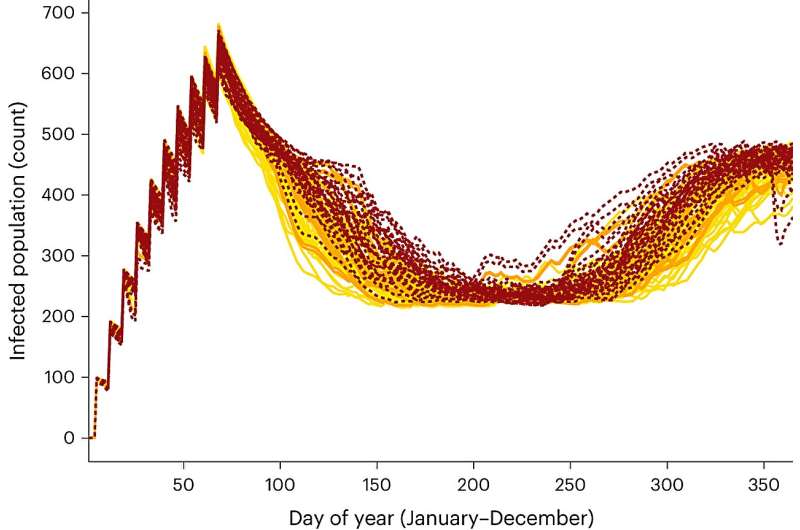August 7, 2023 report
This article has been reviewed according to Science X's editorial process and policies. Editors have highlighted the following attributes while ensuring the content's credibility:
fact-checked
peer-reviewed publication
trusted source
proofread
Modeling shows emerging mosquito control approach might be largely resistant to warming temperatures

A team of epidemiologists and engineers at the University of California, working with a colleague from QIMR Berghofer Medical Research Institute, in Australia, has found via modeling that the use of the Wolbachia approach to slowing the spread of mosquito-borne diseases (MBDs) is likely to survive climate change—at least in the near term.
In their study, reported in the journal Nature Climate Change, the group used population dynamic models using data on mosquitos and Wolbachia bacteria along with temperature increases due to climate change. Eric Caragata, with the University of Florida, has published a News & Views piece in the same journal issue, outlining the work done by the team on this new effort.
Prior research has shown that mosquitos infected with the wMel strain of the bacterium Wolbachia are not able to transmit mosquito-borne viruses. That has led to the release of mosquitos infected with Wolbachia into the wild hoping that they would overtake populations not infected with the bacteria and reduce the number of viruses carrying MBDs.
Thus far, such efforts have shown promise in selected test sites, such as Cairns, Australia. Unfortunately, prior research has also shown that the bacteria are sensitive to high temperatures. These findings have led to questions regarding the effectiveness of using the Wolbachia approach to slowing MBDs as climate change gradually heats most of the places where MBDs are a problem. In this new effort, the research team sought to find out if that might be the case.
In their work, the research team used the Project Phase 5 climate change model to estimate the impact of slowly increasing temperatures in Cairns, Australia, and Nha Trang, Vietnam, another Wolbachia test site. The team found that use of the Wolbachia approach should be viable up until at least the 2030s. Beyond that, the model suggests that increasing heat is likely to diminish the effectiveness of this approach. They conclude that more research is needed to test Wolbachia under real-world conditions to determine where its true survivability thresholds might lie.
More information: Váleri N. Vásquez et al, wMel replacement of dengue-competent mosquitoes is robust to near-term change, Nature Climate Change (2023). DOI: 10.1038/s41558-023-01746-w
Eric P. Caragata, Susceptibility of Wolbachia mosquito control to temperature shifts, Nature Climate Change (2023). DOI: 10.1038/s41558-023-01752-y
Journal information: Nature Climate Change
© 2023 Science X Network





















